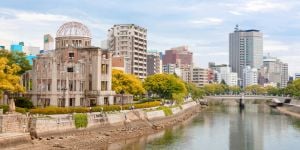
Are you dreaming of doing an internship in the Land of the Rising Sun but don't know how to go about it? You may have heard that internship offers in Japan are rare, and you would like advice on preparing to move to Japan.
Indeed, internships in Japan are scarcer than in other countries. However, it has slowly become a new trend in the past few years. Although COVID-19 significantly impacted the situation, the country has now lifted all measures to prevent the spread of the new coronavirus infection. So, if you want to visit the country and gain hands-on experience via internships, read on for more details.
The internship culture in Japan
Why is it so difficult to find an internship in Japan? You must look back at the Japanese higher education system to understand why. In Japan, you don't need an internship to complete your degree. Students usually join the Japanese labor market once they have graduated.
In fact, the last years of university are devoted to intensive job searches. Young Japanese people attend many job fairs and other professional events, and much of their time is dedicated to job search. Those who get the desired position (seishain or permanent employee contract) leave the university with honors (and great relief). The others remain at the university.
It is uncommon for students in Japan to take a break to do an internship for one or more months. Taking a sabbatical year to travel the world and do internships is considered even worse, hence the low number of internship offers. Although it is difficult to find internship opportunities in Japan, it is not impossible. International companies in Japan are gradually opening up to the internship culture, even though there is no Japanese equivalent for the term internship.
Is a visa required for doing an internship in Japan?
The visa to enter Japan, status of residency, and procedures required for an internship in Japan may differ based on your circumstances and whether or not you will receive compensation for the internship. It is essential to check if labor-related laws and regulations apply to student internships at the nearest Labor Standards Inspection Office.
How to apply for an internship visa in Japan?
If you are from a country or region that is not eligible for visa exemption, you will have to apply for a visa at the Japanese Embassy in your home country, which will verify that you meet all the set conditions. Keep in mind that the application has to be made in person. Do not use a third party.
The information below is a general guide and should be used as a reference only, as Embassies may modify their list of required documents. They may also ask you for more information.
List of documents required to apply for an internship visa in Japan (subject to the discretion of each Embassy):
- Visa application form;
- Passport-size photo and passport (original and photocopy);
- A proof of residence in the country from where you apply for the internship;
- Your school certificate;
- An internship agreement signed by all parties (your university, your host organization in Japan, and you). Your university and the Japanese company must also endorse your internship agreement.
To enter Japan, the sponsoring company must provide you with a "letter of acceptance" and a certificate for registration to the ERFS system.
The acceptance letter should contain information about your internship, such as working hours, payment details, and the hosting company's name. The certificate is a necessary document that your Japanese sponsor typically sends.
Now, the same document is required for WHV applications as well.
To undertake your internship in Japan without payment, you must possess enough financial resources to cover your stay. The Embassy reserves the right to assess your financial situation. If it deems your funds insufficient, it may require a third party to provide a monetary guarantee and evidence of their financial capability.
Types of internships in Japan
Internships when you are residing in Japan
Paid internships
As a student in Japan, if you want to do a paid internship, you must go to the regional immigration residence. You need permission to do activities not allowed under your current residence status, and the procedure will depend on how long the internship is:
- If the internship is less than 28 hours per week and you already have permission for part-time work, you may not need comprehensive permission;
- If the internship exceeds 28 hours per week, you must get individual permission to do activities not allowed under your current residence status unless you are on long-term leave.
Individual permission is usually given to students who have completed their academic year and have almost all the required credits for graduation. However, even if you don't meet these criteria, you may still be eligible if the internship is closely related to your major and required for obtaining credits.
Students with the residence status of "Designated Activities (Continued Job Hunting)" or "(Continued Job Hunting)" or (Prospective Job Offer) are also eligible for individual permission.
It is important to note that engaging in activities other than those permitted without obtaining individual permission is prohibited.
Unpaid internships
If you are a student looking for a job in Japan and wish to do an unpaid internship, you must apply for regional immigration status in advance. You can engage in activities not permitted under your current residence status without needing permission from the administrative office.
If you hold a "Student" or "Designated Activities (Continued Job Hunting)" residence status and want to do an unpaid internship, you must apply for regional immigration status.
Internships when you are not residing in Japan
The type of residence status you are eligible for will depend on whether or not you receive payment for your internship and how long the internship lasts.
Suppose you are participating in an internship as part of your studies at an overseas university. In that case, the Japanese company offering the internship must have proper systems and guidance to support you. Additionally, the internship should be directly related to your major. It must be conducted as part of your academic studies, such as earning credits.
Paid internships
Suppose you are studying at an overseas university and want a paid internship at a Japanese company. In that case, you must have a "Specified Activities" residence status to enter Japan.
The internship should not last more than one year and should not exceed half of the total study period at the university. After completing the internship, you will receive a university degree or course completion certificate.
You must be enrolled in a designated educational institution to be eligible.
Unpaid internships
Suppose you enroll in an overseas university and do an unpaid internship at a Japanese company. In that case, the applicable residence status will depend on the duration of the activity:
- If the activity period is more than 90 days, you will need to enter Japan under the status of residence called "Cultural activities". The Japanese company must apply for a Certificate of Eligibility for internships;
- If the activity period is 90 days or less, you will need to enter Japan under the status of residence called "Temporary stay".
Suppose you are from a country or region that is not eligible for visa exemption. In that case, you must apply for a visa to Japan before coming.
For the necessary materials, you'd better check the Japanese Immigration Services Agency's official website
If you are already in Japan with a Japanese Working Holiday Visa (WHV), you can try a new experience and look for an internship. The student and WHV allow you to work 28 hours per week.
Are scholarships available for foreign trainees in Japan?
Several types of scholarships are available in Japan. They are usually offered study scholarships through JASSO (Japan Student Service Organization) or JISTEC (Japan International Science and Technology Exchange Center) for research scholarships. These scholarships are reserved for students who wish to continue their studies in Japan.
Other scholarship options can be found through agencies like Euraxess Links Japan, the Matsumae Foundation, or the Japan Foundation. However, these scholarships are reserved for research and doctoral students. There is not a specific scholarship for foreign interns in Japan.
Check with your university to find out where to pursue your studies in Japan.
Remember that in Japan, as elsewhere, internships are generally poorly paid (when they are paid at all). Hence, Japanese immigration will want to ensure you can sustain yourself without working.
Important:
Do not accept any offer if you do not have the required visa. Japanese authorities do not joke with the law, and you risk deportation.
How to find internship offers in Japan?
Universities
Does your university in your home country partner with Japan or companies in Japan? Does it have links with Japan? Have you chosen a university that offers an international curriculum, with the possibility of doing an internship in Japan? Find out how to apply from your university.
Sister cities
Many cities in the world are twinned. More than a symbolic title, these twinning arrangements create genuine cultural and economic partnerships. For example:
- Tokyo is twinned with New York City, Beijing, Paris, New South Wales, Seoul, Jakarta, São Paulo (state), Cairo, Moscow, Berlin, Rome, and London;
- Osaka is twinned with Chicago, Milan, Saint Petersburg, Hamburg, and Shanghai;
- Fukuoka is twinned with Guangzhou City, Atlanta, Busan, Bordeaux, Ipoh, and Auckland.
Studying in the sister city of a Japanese city can open doors to future internships and ease the process. Contact your university for more information.
International companies
Many major Japanese companies, like Panasonic, Nintendo, Sony, Toshiba, Hitachi, and many more, are now open to the international labor market and the internship culture. Try your luck with them.
Don't wait for internship offers to be published. Apply spontaneously. Consider smaller companies as well, but ones that work in connection with Japan or have a presence there.
Organizations
Chambers of Commerce and Industry, job search organizations, associations, and embassies are as many organizations that can propose internships in Japan. The Japan Society, an American instance, offers internship opportunities primarily for American citizens, but anyone can apply.
The Vulcanus program also offers internships in Japan to students studying engineering and other scientific fields. This opportunity is available to EU nationals and citizens of SMP-associated countries. The program begins in August and concludes in March of the following year. If you are interested in this program, check the official website at the end of this article.
Job boards
Job search websites also host internship offers. Try your luck on GaijinPot, Jobs in Japan, or Daijob. If you speak Japanese, do your search in the local language. You will get more results.
Networking
You may know a friend, an acquaintance, or a colleague who has managed to find an internship in Japan. Some even manage to transform their internship into a long-term job. Usually, the company that recruited them as interns was satisfied enough with their work to sponsor their long-term visas.
Do not hesitate to use your network if you aim for a stable job in Japan or professional experience. Someone you know might introduce you to a company. Word-of-mouth and informal contacts have proven to be very effective.
Beware of shady internship offers
Beware of overly tempting offers. This warning is especially true for those not going on an internship. If you take advantage of your student visa or WHV to do an internship, choose the company properly. Check with the HR department to ensure you are eligible for the internship. Ask for a contract. Remember that working hours are limited.
Some unscrupulous employers may take advantage of your poor knowledge of the law to make you work as a full-time employee, but without the pay and protection that goes with it.
Is knowledge of Japanese compulsory for doing an internship in Japan?
As with finding a job in Japan, speaking Japanese will increase your chances of finding an internship. However, companies are quite lenient, so being bilingual is not compulsory, but your fellow competitors probably will be.
Many young people dream of moving to Japan to study Japanese. Do your best to master the language basics or even have a conversational level (N3, intermediate). This is even more true if you are doing an extended internship.
Planning your move to Japan as an intern
Importance of diplomas
Do you have a bachelor's or a master's degree? Higher education in Japan is as competitive as in many Western countries. Your diploma, especially if it does not come from an internationally recognized institution, will certainly not speak to your Japanese recruiter. However, the level of your diploma may reassure them or motivate them to choose you.
Speaking Japanese
Do you speak Japanese? As mentioned above, becoming an intern in Japan without speaking Japanese is possible, but this doesn't mean it's easy so don't wait until you leave for Japan to learn Japanese.
The competition is tough, and COVID-19 has only made things worse. As much as English is a must (whether you travel or not), Japanese is just as important, especially if you want to work in Japan later on. If you have a good command of Japanese, you will be able to apply for more internship opportunities.
Purpose of the trip
Take the time to define the purpose of your trip. Are you looking for a job in the long run? Do you want to learn about Japanese culture? Set goals for yourself to better target your internship search in Japan.
Explore the country
When you arrive in Japan, set a few days aside for administrative matters. Moving to a foreign country can be stressful, especially if it is your first-ever international relocation. Get the most out of the first days following your arrival to take care of all your administrative procedures (city hall, telephone and internet subscription, etc.).
Start your research well in advance. In Japan, schools and professional life start in April. Use your free time to work on your Japanese and other languages. Working in Japan, even as an intern, can be tricky (especially in this time of crisis) but not impossible. Be patient and stay positive.
Useful links:
We do our best to provide accurate and up to date information. However, if you have noticed any inaccuracies in this article, please let us know in the comments section below.








